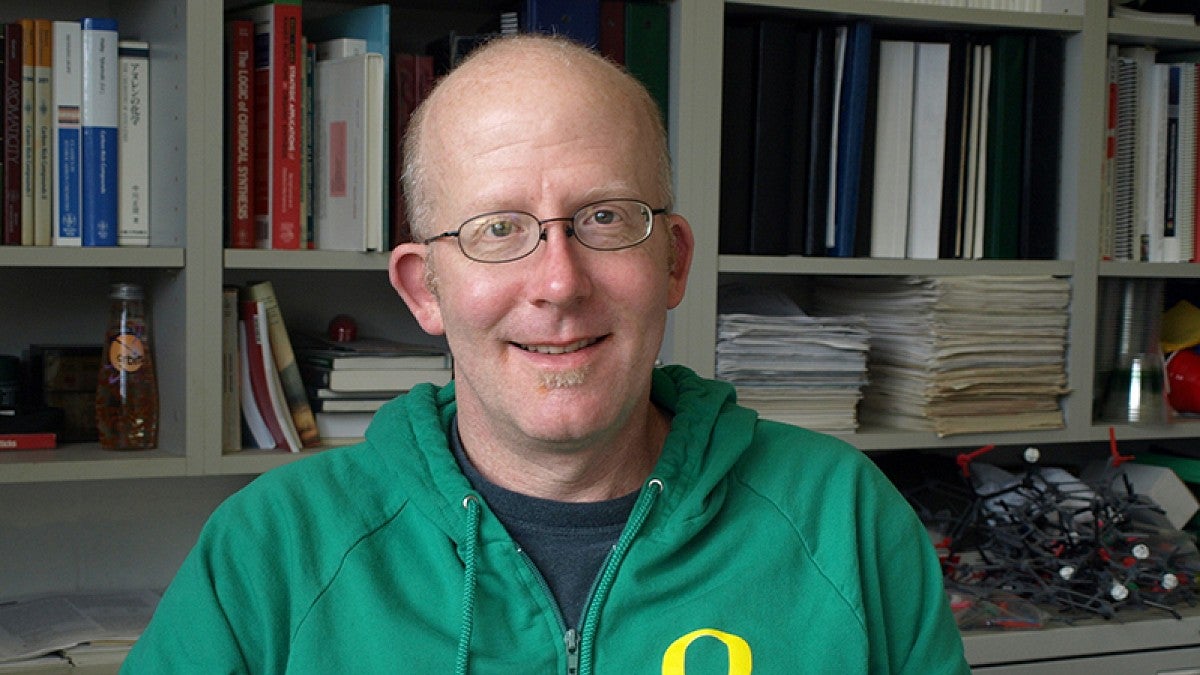Michael Haley was talking with his students in the lab when he found out he was chosen for an award from the American Chemical Society.
“It was one of the best phone calls I’ve ever received in my life,” said Haley, the UO’s Richard M. and Patricia H. Noyes Professor of Chemistry. “It’s an honor.”
The George A. Olah Award in Hydrocarbon or Petroleum Chemistry recognizes outstanding, highly original research achievements. The chemical society is one of the world’s largest scientific organizations, with more than 150,000 members in more than 140 countries.
Haley is the third member of the current faculty in the Department of Chemistry and Biochemistry to receive an American Chemical Society national award. The others are Presidential Chair in Science and chemistry professor Geri Richmond and Tom Greenbowe, senior instructor of chemistry and biochemistry.
“It’s a tremendous validation of your work to be recognized by your peers,” Haley said. “Also, I had the pleasure of meeting George Olah and speaking with him on a couple of occasions, which makes this very special.”
Hungarian-born scientist George A. Olah won the Nobel Prize in Chemistry in 1994 for his work with carbon compounds. Olah’s research of carbocations transformed the study of organic chemistry, and his discoveries about hydrocarbons led to cleaner burning gasoline and new drugs.
The UO has a long history of innovative hydrocarbon research, Haley said. Professor Virgil Boekelheide, who served on the UO faculty from 1960 to 1984, was a member of the National Academy of Sciences and one of the best-known hydrocarbon chemists in the country.
“We have an outstanding group of faculty that is carrying on that tradition today,” Haley said.
Haley has filed or been issued 13 patents, but said he’s most proud of the more than 200 papers he and his UO colleagues have published. He added that the caliber of journals publishing UO research is a testament to the quality and depth of the work happening in the chemistry department.
Hard-working students help make that success possible, Haley said. These research opportunities are a win-win, he added, giving students valuable experience that leads to successful careers.
“Working with students is fun, and it keeps me young,” Haley said. “When they help discover a new molecule or new and unusual properties of a molecule, it’s thrilling.”
After earning his undergraduate and advanced degrees at Rice University, Haley joined the UO faculty in 1993. His early UO research focused on graphynes, single-molecule layers of graphite with porous properties that could have applications for lithium batteries.
More recently, Haley’s research has shifted to creating hydrocarbon molecules that accept electrons and become negatively charged.
“All the electronic devices we use (like the cell phone I’m holding) have molecules that give up electrons to become positive and molecules that accept them to become negative,” Haley said. “That’s our newest frontier.”
In addition to help from hard working students, Haley credits his success to effective mentoring and support from the UO administration.
Unlike the antiquated “sink-or-swim” approach that once dominated university research and is still common today, Haley said the UO offers a collaborative ecosystem that fosters risk-taking and independence while providing the appropriate level of help along the path to new discoveries.
“I’ve never had anybody tell me what I can or cannot do, in terms of areas of research,” Haley said. “I’ve had excellent mentors and colleagues. And we get a tremendous amount of support from the Office of the Vice President for Research and Innovation.”
—By Ed Dorsch, University Communications


